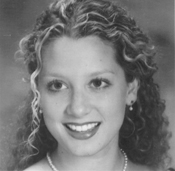All of my life, I have known that I wanted to be a physician in order to heal the afflicted. Yet I also knew that I did not want to follow in the footsteps of so many of my peers by earning a Biology degree. I wanted to do something different. I wanted my time as an undergraduate to be spent learning something that I am not only truly interested in, but also a subject that I would not have the opportunity to study in-depth in the future. Thus, I chose to major in Religious Studies.
The majority of outsiders to this field probably confuse this department with theology. However, in the words of Dr. Jacobs, “This is not Sunday School.” Similarly, it is not my intention to proselytize to my future patients. There are many religious and spiritual issues pertaining to the practice of medicine. It is necessary for doctors to possess a valid concern for the spiritual as well as the physical aspect of the patient. While there is much to say regarding faith healing and the power of prayer in healing, I am even more fascinated by how people use their religious or spiritual background-be it consciously or not-when making decisions regarding their health. My undergraduate education has provided me with lessons in understanding cultures and what it essentially means to be human. Not all of my patients will be of the same religious background or culture as me. It will thus be important for me to recognize the pluralistic nature of patients’ views and not treat them as if they are all the same. Furthermore, an individual’s culture often determines his or her attitudes toward medical treatment, terminal illness, and even death.
In my efforts to treat the whole person, I must gain as much insight as possible. Being a Religious Studies student, I have been given ample opportunity to cultivate my critical thinking skills and to learn the ever-important skill of asking the right questions, so as to become a better listener and communicator. The field of medicine is not cut and dry. There are many results that are unexplainable by simple science alone. In the words of Albert Einstein, “Science without religion is lame, religion without science is blind.” There is a remarkable degree of truth in both fields, and a truly successful physician can balance both.
Finally, a degree in Religious Studies is not just for someone who is applying to seminary and solely interested in spiritual health. There are many aspects to healing beyond diagnosis and prescriptions. As a result of my experiences in Religious Studies, I have heightened my awareness of, and sensitivity to, the spiritual dimensions of my future patients and of their loved ones as they deal with disease, disability, and decreasing independence. In closing, I know I am better-prepared to become a caring and competent physician.
Kristin Bradbury has applied for admission to medical school, starting in Fall 2005.

Degree: Religious Studies